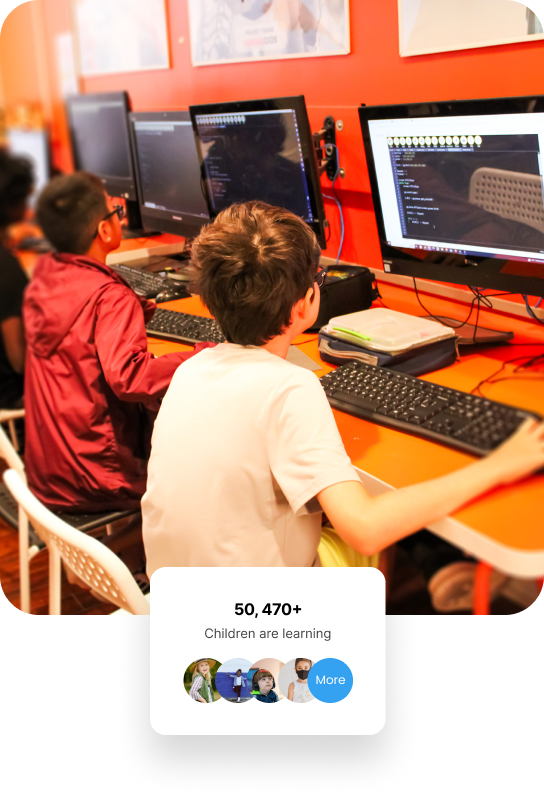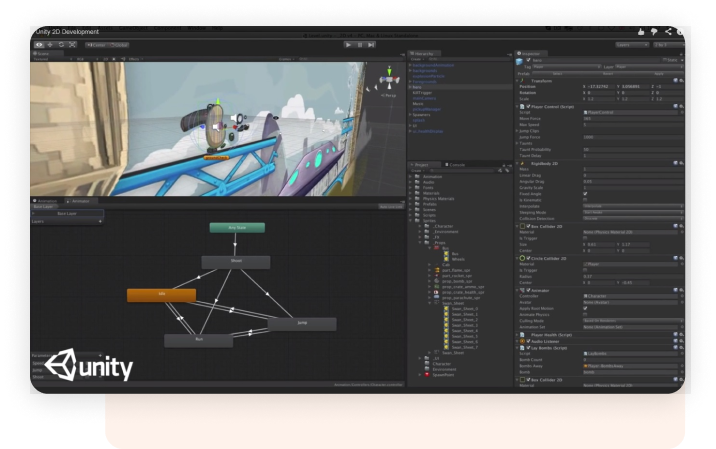Game Programming Classes for Kids
Game programming is a great way of teaching kids Coding. This curriculum teaches Python language by creating games. Students learn simple games that use keyboard and mouse.

What Your Child will Learn ?

Coding
Students use game programming as a fun way to learn the Python language. Python is rated as the #1 most used language in the world.

Mathematics
Creating games teaches students math concepts such as coordinate systems, arithmetic operations, fractions and relations. s

Problem-Solving Skills
At the start of each class, the instructor provides a lesson, after which students work on their games independently. To complete the task, students must think, code, and test.

Preparing for the future
Game programming and the Python language encourage students to learn coding while having fun. Kids are introduced to the world of computer science, which is one of the most rewarding careers today.
Your Kids will Learn ?

Coding
students can learn the C Language in an engaging and interactive manner by using it to the control robot through various sensors.

Electrical Design and 3D Printing
To build robots, student must learn design software and 3D printing. Additionally ,they learn about circuits to create more intricate robot

Problem-Solving Skills
At the start of each class instructor provide a lesson, after which students work on their project independently. To complete the task, student must think,code ,build and test their robots.

Preparing for the future
Robotics classes help children learn about real-world and career based skills such as programming, engineering and design which can prepare them for lecture careers in STEM fields.
Request your free trial



Why Exceed ?

Trained Instructors
Our instructor undergo a thoroug training to ensure children receive an exceptional learning experience

Hands-on STEM Projects
At Exceed, we believe that fun is an integral part of the learning journey. Our students have access to a range of hands-on learning opportunities

Small Student Ratio
To ensure exceptional student experience, we maintain 6:1 student to instructor ratio
Here’s how it works

Register a free trial class
Offered every week at all location in GTA. This 1 hour hands-on class give your child glipmse of Robot Programing
.png)
Get a schedule for the upcoming term
We offer classes on various days and times to help you choose the schedule that works best for you.This is often most challenging step! juggling all kids activites.
.png)
Enroll in program
Once you have selected a preferred day and time for the program,you are all set. You just need to wait untill its begin,but don't worry ,once you start you don't have to stop
Coding Courses
PY-01: INTRODUCTION TO PYTHON GAME PROGRAMMING
Designed to introduce student to coding in Python through a fun application - Game Programming. Students learn programming fundamentals using an object-oriented language. Concepts such as variables, if statements, while loops, mouse input, and basic shapes are taught in the first course. Students complete the course by creating a simple game with Python.
PY-02: GAME PROGRAMMING FUNDAMENTALS I
Designed to introduce student to coding in Python through a fun application - Game Programming. Students learn programming fundamentals using an object-oriented language. Concepts such as variables, if statements, while loops, mouse input, and basic shapes are taught in the first course. Students complete the course by creating a simple game with Python.
PY-03: GAME PROGRAMMING FUNDAMENTALS II
Our third game programming course focus es on one of the most important concepts of object oriented programming classes. Classes play a big role in game programming by simplifying code and have extensive uses in non game programming applications. Students will create several games throughout this course to better understand and practice this concept.
PY-04: GAME PROGRAMMING APPLICATION
The final Game Programming course has an open project to provide students with the opportunity to apply the learned concepts for programming a game on their own. Students receive a project outline with game requirements and options to make the game more interesting. At the end of this series of courses, students would have built a solid understanding in programming and coding in Python.
PY-05: IMAGE PROCESSING
We start the first of the Artificial Intelligence courses with Image P rocessing . In this first course, students will learn how to manipulate an image in prepar ation for object detection using various AI tools . students will practice image manipulation including resizing , rotation, scaling and applying filters to images to highlight ar of interest for image recognition.
PY-06: AI OBJECT DETECTION
Through writing programs to detect colours and recognize traffic signs, students learn how to create their own AI applications. In this course, students will use APIs to create simple object and colour detection programs. Programming sills learned in these two image recognition courses will prove useful in developing AI apps in future courses
PY-07: AI SPEECH RECOGNITION
Speech recognition and text to speech (TTS) are two of the main applications of AI in most smart devices . Students will learn how to create programs to listen to a user and understand words and sentences. They will also learn how to convert written text by users into audio sentences. Combining image and speech recognition, We are ready to proceed to building AI applications!.
PY-08: INTRODUCTION TO RASPBERRY PI
Students will be introduced to the Raspberry Pi and program & build applications using Python. Raspberry PI is a complete computer that costs less than $100 and could execute Python code. It can be equipped with a camera, microphone and speakers and has built-in Wi-Fi. All this capability inside a device that fits in your pocket.
PY-09: RASPBERRY PI CAPSTONE PROJECT I
The final two courses in Python curriculum integrate Python with Raspberry PI to create an AI device . The class will be given a choice of high tech applications similar to Siri, Google Assistance, Alexa, security c amera system with motion detection , etc Students will work with the instructor and utilize online resources to create and execute a project of their choice.
PY-10: RASPBERRY PI CAPSTONE PROJECT II
Students continue working to complete their Capstone Projects which will be submit ted at the end of this course for graduation At this point student s are fully capable of creating simple to medium complexity AI devices using Python and Raspberry Pi. During graduation, students will receive their diploma in Python & Artificial Intelligence!
Partners







